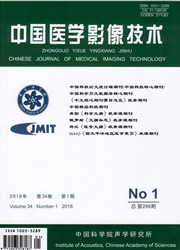

 中文摘要:
中文摘要:
目的探讨过继免疫高强度聚焦超声(HIFU)治疗H22移植性肝癌后活化的T淋巴细胞在荷瘤鼠肿瘤局部的功能变化。方法 32只C57BL/6J近交系正常小鼠在H22肝癌移植后7天分别接受HIFU治疗(HIFU组,n=16)和HIFU假照治疗(假照组,n=16)。治疗后14天,分离两组荷瘤鼠和正常C57BL/6J鼠(对照组,n=16)的脾淋巴细胞。以乳酸脱氢酶释放法测定各组小鼠脾淋巴细胞对H22细胞体外杀伤活性;另选30只C57BL/6JH22荷瘤鼠随机分为过继免疫HIFU组、过继免疫HIFU假照组和过继免疫对照组,分别静脉注射之前提取的淋巴细胞。输注7天后处死小鼠,手术取出肿瘤组织块,制成单细胞悬液,酶联免疫斑点法检测肿瘤局部T淋巴细胞的功能变化。结果与假照组和对照组比较,HIFU组对H22细胞杀伤活性明显增强,差异有统计学意义(P均〈0.01);淋巴细胞过继免疫治疗后7天,与过继免疫假照组和过继免疫对照组比较,过继免疫HIFU组能分泌INF-γ淋巴细胞数量明显增加,差异有统计学意义(P均〈0.01)。结论 HIFU治疗H22移植性肝癌后,活化的T淋巴细胞在肿瘤局部发挥特异性抗肿瘤效应。
 英文摘要:
英文摘要:
Objective To investigate the functional changes of HIFU-activated T lymphocytes after adoptive immunotherapy in the homogeneous tumor-bearing mice. Methods Thirty-two C57BL/6J normal mice received HIFU (HIFU group,n=16),sham-HIFU (sham-HIFU group,n=16) exposure 7 days after tumor implantation. Fourteen days after HIFU treatment,spleen lymphocytes were extracted in each treated-mouse. In addition,spleen lymphocytes extracted from 16 C57BL/6J normal mice (control group) were used as controls. Using lactate dehydrogenase assay,the cytotoxic activity of the lymphocytes against H22 tumor cells was assessed in vitro in each group. Thirty C57BL/6J mice bearing H22 tumor were randomly divided into adoptive HIFU group,adoptive sham-HIFU group and adoptive control group. They underwent intravenous injection lymphocytes extracted before via the tail vein respectively. Seven days after injection,surgical procedure was performed to obtain the implanted tumor in each mouse. Viable tumor tissue was minced and dispersed to a single-cell suspension. The ELISpot assay was used to measure the number of IFN γ-secreting lymphocytes. Results Compared to the values in both sham-HIFU and control groups,the cytotoxicity against H22 tumor cells significantly increased in HIFU group (all P0.01). Compared to the adoptive sham-HIFU and adoptive control groups,INF-γ sereting lymphocytes significantly increased in adoptive HIFU group (all P0.01). Conclusion After HIFU treatment of transplanted liver cancer H22,the activation of T lymphocytes plays an important rolein specific anti-tumor.
 同期刊论文项目
同期刊论文项目
 同项目期刊论文
同项目期刊论文
 Serial observations on an orthotopic gastric cancer model constructed using improved implantation te
Serial observations on an orthotopic gastric cancer model constructed using improved implantation te Non-thermal ablation of rabbit liver VX2 tumor by pulsed high intensity focused ultrasound with ultr
Non-thermal ablation of rabbit liver VX2 tumor by pulsed high intensity focused ultrasound with ultr Outcome of unintended pregnancy after ultrasound-guided high-intensity focused ultrasound ablation o
Outcome of unintended pregnancy after ultrasound-guided high-intensity focused ultrasound ablation o Combination of high-intensity focused ultrasound with nanoscale ultrasound contrast agent in treatme
Combination of high-intensity focused ultrasound with nanoscale ultrasound contrast agent in treatme 期刊信息
期刊信息
